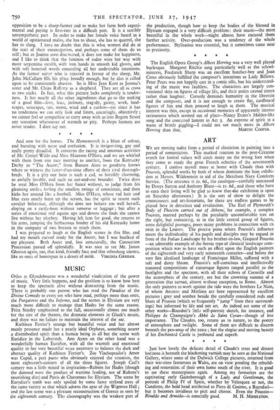MUSIC
Orfeo at Glyndebourne was a wonderful vindication of the power of music. Very little happens, and the problem is to know how best to keep the spectacle alive without distracting from the music. There is probably one person who has read the Paradiso of the Divine Comedy to every ten who have read, perhaps more than once, the Purgatorio and the Inferno, and the scenes in Elysium are very much more difficult to manage than Hades for the same reason. Fritz Stiedry emphasised to the full, occasionally almost too much for the size of the theatre, the dramatic elements in Gluck's music, and there was no failure to maintain the interest of the ear.
Kathleen Ferrier's strange but beautiful voice and her almost manly presence made her a nearly ideal Orpheus, something nearer a disembodied spirit than a human being in all but the scene with Euridice in the Labyrinth. Ann Ayars on the other hand was a wonderfully human Euridice, with all the warmth and emotional quality in her very beautiful voice necessary to balance the dark and abstract quality of Kathleen Ferrier's. Zoe Vlachopoulos's Amor was Cupid, a pert putto who obviously enjoyed the situation, the most eighteenth-century of all the three figures. Joseph Carl's scenery was a little mixed in inspiration—Rubens for Hades (though the damned were the product of wartime feeding, not of Rubens's nourishing diet) and Puvis de Chavannes for Elysium. The scene by Eurydice's tomb was only spoiled by some fussy stylised trees of the same variety as that which adorns the apse of the Wigmore Hall ; and the last scene was a pleasant reconstruction of Greece as seen by the eighteenth century. The choreography was the weakest part of the production, though how to keep the bodies of the blessed in Elysium engaged is a very difficult problem: their music—the most beautiful in the whole work—might almost have excused them further activity. Over-production was a tendency of the whole performance. Stylisation was essential, but it sometimes came near to preciosity.
* * * * The English Opera Group's Albert Herring was a very well played burlesque. Margaret Ritchie sang particularly well as the school- mistress, Frederick Sharp was an excellent butcher-boy and Joan Cross obviously fulfilled the composer's intentions as Lady Billows. Peter Pears was not happily cast in a comic role, but his understand- ing of the music was faultless. The characters , are largely con- ventional skits on figures of village life, and their antics caused titters rather than laughter. Comedy demands humanity in the librettist and the composer, and it is not enough to create flat, cardboard figures of fun and then proceed to laugh at them. The musical interest was thin, except in occasional moments of apparently intense seriousness which seemed out of place—Nancy Evans's Mahler-like song and the concerted lament in Act 3. An expense of spirit in a waste of brittle giggling—I could not see much more in Albert


































 Previous page
Previous page